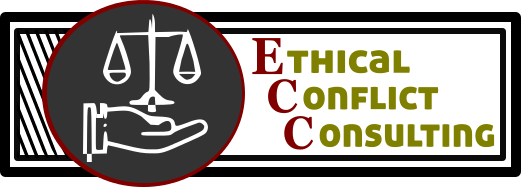We All Work in Sectors of the Economy
A well-known and worthwhile division of any economy is made by considering where people work. People work: (1) in the primary sector, which involves the extraction of natural resources; (2) in the secondary sector, manufacturing goods, doing construction, packaging etc.; (3) in the tertiary sector or service sector; and (4) in the quaternary sector, which is the knowledge-based sector, producing goods and services. Professionals and other workers do this in (1) by extracting anything from coal to diamonds and fish, trees, and crops. They do this in (2) with the factory productions of canned fruits and vegies, toys, constructions of buildings, roads, and anything else made by humans.
You and I work in one or more of these sectors. Our consulting firm, Ethical Conflict Consulting (ECC), is in the tertiary and quaternary sector, for example. We offer educational services to people like you–people who work in a sector of the economy. We can work with you and understand your concerns about your work and your position. We do this through business and professional ethics because these practical types of ethics are tied to each industry in each sector of each economy. Developing and maintaining professional ethical habits at work is one necessary key to success.
We Work in Distinct Types of Countries
Educational services for professionals and other workers an benefit each country. However, it is necessary to understand cultural differences of people who come from developed countries (e.g., USA, Norway, Japan, Argentina and Germany) who work in developing countries (e.g., China, India, Mexico and Romania). Also, we understand the differences between those people who are from developing countries and who work in developed nations.[1]

Typically, underdeveloped countries have most of their national employment in (1) the extraction sectors in some industry or industries, including forestry, mining, agriculture, fisheries etc. Developing countries have the majority of their workers in (2), the manufacturing sectors. People in developing nations manufacture all sorts of goods and construct infrastructures of their societies, working with metals, plastics, buildings, and engineering things. Developed countries have most of their workers in (3), the service sectors. These services include teaching, financial services, distribution, internet and communication technology and legal services and many other services.

What Ethical Conflict Consulting Can Do for You
Firstly, you need a completely confidential service that aids you in the process of your own self-education about your work situation. You should have an honest assessment of your situation at your workplace. It is best to begin by analyzing the country, district, economic sector, industry and finally your own workplace to gain enough knowledge to improve your situation at work.
Learn the relevant facts about your industry and the economic sector in the country where you work.
Obviously, your work environment and co-workers are important to understand in your industry. Focus on gaining an understanding of the people who work closely with you and who you may perceive as being with you, against you, or neither. You can start doing this by uncovering how you have been wronged. Ask our professionals to take our Work Assessment Questionnaire at info@ethicalconflictconsulting.com.
Ideally, a service providing labor education provides you with a set of strategic actions for evaluating your situation and your value to your organization. However, without observing your interactions with co-workers, customers and others in your work environment, it is impossible to guarantee that any single strategy will direct your best course of actions. For this reason, consider the strategies for maximizing your potential at work.

Not everyone is suited as an employee for certain types of firms or certain types of managers. An organization or manager can certainly give you the feeling that your work is underappreciated or vice versa. In either case, they may be taking advantage of you. They may disrespect your original agreements, such as an employment contract. Organizations and managers often disrespect their subordinates’ agreements with their organization in ways that go unnoticed. Educate yourself on how, and to what extent, your situation at work involves others taking advantage of you.
Ethical Conflict Consulting (ECC) aims to increase safety, efficiency, fairness and professional communications at workplaces via reducing ethical conflict. Ethical conflict includes toxic cultures at workplaces, conflicting goals, unrealistic goals, misuse of the organization’s technology and unethical leadership practices. Use the ECC website to discover the methods and strategies to use for increasing professionalism and success with ethics at the workplace.
What is needed is an honest assessment of healthy work-life balances. Over the course of your career you are likely to require suggestions for exit strategies, promotion strategies, or professional forms of retaliation against co-workers who are trying to get you fired, to belittle you or to minimize your position of power at work. To be sure, all of your strategies should include applied ethics and are applicable for work in hostile workplaces. A part of ethics, as applied to your profession, is working cooperatively with others and respecting each other’s values in order to compromise and create the best plan for you and plans for everyone to apply at work.
[1] Managers who hire workers of specific age groups and from specific types of countries often have different expectations for these employees. They often tend to expect them to work extra hours without extra pay. They often deny their vacation times, which violate their contracts and place employees and managers in situations of conflicts of interest. Learning to “stand your ground,” to say no in respectable ways, and to complain professionally are challenging skills to learn, and, in fact, some people can work for decades with high-quality managers and never learn and acquire these skills.

